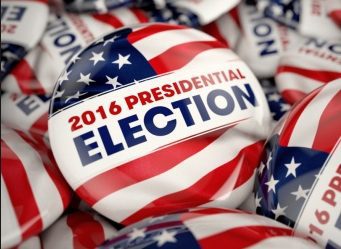The upcoming 2016 presidential election certainly has captured the attention of most U.S. consumers for both its political and entertainment-driven value. But as retailers and shoppers await the results with uncertainty, consumer spending may not be significantly impacted. In fact, retail sales have increased 0.6% in September 2016 — the biggest spending jump in three months.
The majority of consumers have stated that the election results aren’t going to affect their holiday spending, according to RetailNext. As many as 70% of shoppers say that if Republican nominee Donald Trump is elected, their spending habits will not change, while 68% say the same if Democratic nominee Hillary Clinton is elected.
“Who wins the election matters little to the retail outcome,” said Marshal Cohen, Chief Industry Analyst at The NPD Group. “While it may matter to them personally, it doesn’t change the needs of the consumer.”
And despite the fact that 2016 is an election year, the National Retail Federation (NRF) recently forecast a 3.6% increase in 2016 holiday spending, higher than the forecast growth rate of 3.0% in 2015, a non-election year.
“No matter what happens, I just don’t see a significant change,” Ken Morris, Principal at Boston Retail Partners (BRP), said in an interview with Retail TouchPoints. “I think retailers are taking the lead from the consumer. The consumer hasn’t backed off, and quite the opposite is happening. Retailers are realizing that it’s not such a disaster, and that whatever happens, the consumer is still likely to be spending. That’s what drives retail. Despite all the distraction, more people have jobs and they have more disposable income, and that’s going to be reflected in the holiday sales.”
It’s not to say American shoppers aren’t still concerned about the election’s fallout; they definitely are, and that puts many brands in an unenviable position. As an example, SMB retailers, which may be less equipped to ride out dramatic changes in consumer behavior compared to larger companies, may have to cut spending significantly until the political situation becomes clearer.
When it comes to the average U.S. shopper, 61% believe the presidential election is the top threat to the U.S. economy over the next six months, according to a recent poll from Bankrate. This total far outweighs any other potential concerns, including terrorism (12%); struggling overseas economies (9%) and stock market decline (8%). So while consumers aren’t afraid to spend, retailers must understand that these shoppers still have a heavy feeling of uncertainty hanging over their heads.
Expect A Drop In Foot Traffic During Election Week
Short-term, fewer people may be shopping in stores during the week leading up to the election, but retailers should not be surprised — and should not immediately point fingers at the current candidates. This has been a similar trend in past elections.
In the week prior to the 2008 election, mall foot traffic dropped 3.7% in the week before the election and 6.3% during the week of the election compared with the corresponding weeks in the previous year, according to data from ShopperTrak.
A similar scenario occurred during the 2012 election: Retail traffic decreased by 6.1% two weeks ahead of Election Day and dipped 12.9% one week ahead. During election week in 2012, traffic declined by 12.4% compared with the same week in 2011.
But the post-election week could be a windfall. “Retailers should prepare for the weekend following the election to be a big shopping weekend,” noted Deborah Weinswig, Managing Director at Fung Global Retail & Technology, in the report: 2016 Presidential Election Outlook. “With uncertainty abounding and retailers struggling to find airtime between political ads, consumers tend to put shopping trips on hold prior to elections.”
Halloween actually will serve as a great test to gauge consumer spending within close proximity to the election. Americans plan to spend a record $8.4 billion on Halloween in 2016, up 22% from $6.9 billion last year, according to an NRF/Prosper Insights & Analytics survey.
“After an election, consumers have always shown a return to normalcy, with a touch of pent-up demand,” Cohen of NPD Group said in an interview with Retail TouchPoints. “This year the consumer will have the additional incentive of aggressive sales leading off the holiday season, as retailers move even further into what I’m now calling ‘Black November.’”
Election Could Be The Scapegoat For Poor Holiday Sales
The election does create a built-in rationale for brands that don’t have a successful holiday season. As traditional retailers continue to experience difficulties drawing in sales and repeat consumers, these brands often deflect the blame to uncontrollable factors such as weather patterns, the value of the dollar or even oil prices. With CEOs at brands such as Gap and Barnes & Noble already expressing their concerns regarding economic uncertainties that lie ahead, it wouldn’t be a surprise to see end-of-year quarterly statements attributing results to the election.
But retailers concerned with election results are “reaching” if they plan on attributing poor sales results to the election’s outcome, said Ken Perkins, President of Retail Metrics, in an interview with Bloomberg.
“I don’t think it’s affecting moms as they go out and do their weekly shopping,” Perkins explained. “If it’s something you do on a regular basis, you’re not going to stop doing it because you’re worried about which candidate is going to win. [Also,] it doesn’t seem to be affecting Amazon’s sales.”
Although consumers aren’t likely to make different purchases based on the winning candidate, the economy as a whole generally benefits when the incumbent party wins, so retailers may be interested in keeping note of that historical data. Since 1900, the Dow Jones Industrial Average (DJIA) has performed better when the incumbent party wins (14.6% increase over average) than when it loses (4.4% decrease) the election, regardless of which party won, according to data from Ned Davis Research.
SMBs Remain Cautious As Election Approaches
With the 2016 election showcasing two non-incumbent candidates, it does make sense that many retailers remain uncertain about the general direction of their business from an economic standpoint. Small businesses that have a lot to lose if consumer spending habits change have expressed this sentiment.
Roughly one-third of 715 small-business owners surveyed in June by The Wall Street Journal and Vistage Worldwide Inc. said that uncertainty related to the presidential election is having a negative impact on their business. The report revealed that many of these businesses had delayed hiring, put off investments or reduced new equipment orders. But many of these actions may not necessarily reflect this specific election, but all election seasons in general.
“The number one thing that retailers need to do at this time is stay positive and project that positivity to their customers,” said Matt Pruitt, an analyst at Blacks Retail. “The economy is good. The election and other external factors are unlikely to affect our day-to-day lives and if they do, shopping is still a great pick-me-up.”
Regardless of the election’s outcome, Morris of BRP advised retailers to “stay the course” as far as deploying their holiday strategies and plans. With consumer confidence reaching a nine-year high in September 2016 as more shoppers gain faith in a resilient labor market and continued economic growth, retailers should take the time to reciprocate that self-assurance into the holiday season.
“No matter who wins, holiday 2016 will show up,” Cohen said. “And your gift list will likely remain intact. So unless you are related to one of the candidates, you will likely still have no excuse to skip those family members on your list.”













3 Ways Livestreaming is Shaking Up the Retail Marketing Playbook